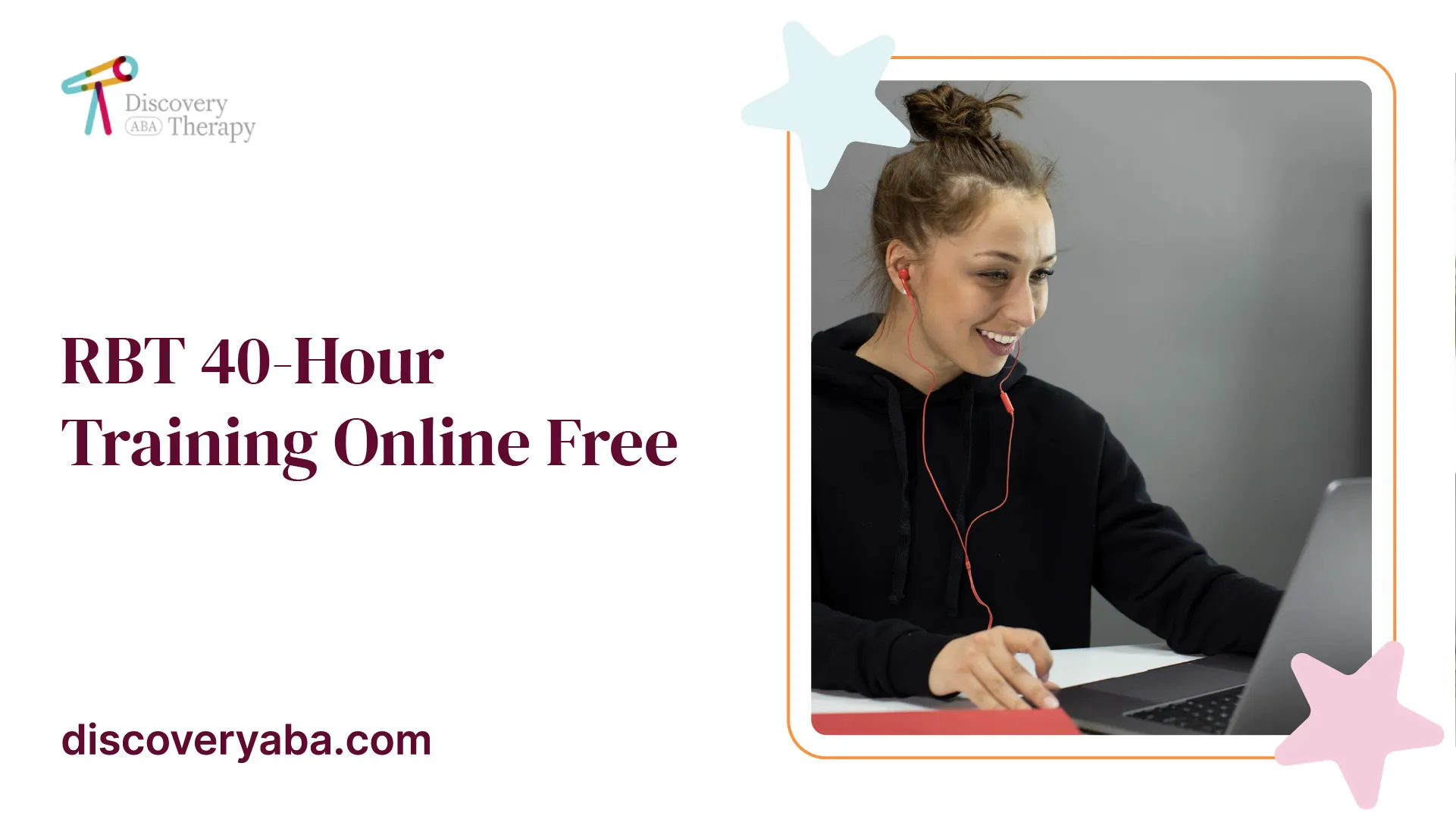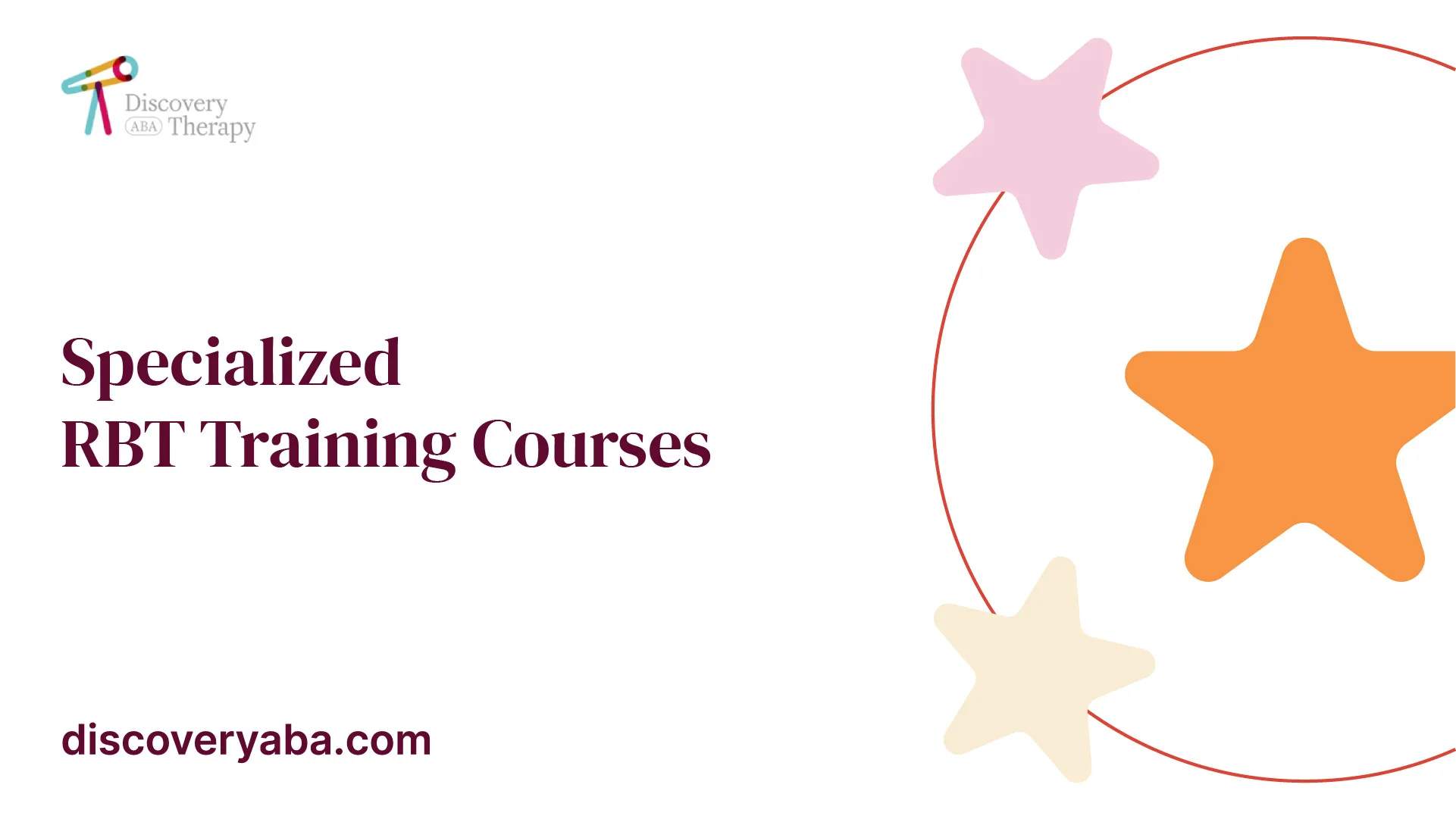RBT 40-Hour Training Online Free
Discover RBT 40-hour training online free! Unlock essential skills for supporting individuals with autism.

RBT Certification Overview
Obtaining RBT (Registered Behavior Technician) certification involves meeting specific training hour requirements and understanding the associated costs. This certification is essential for individuals seeking to support people with autism and related behavioral needs effectively.

Training Hours Requirement
To become a certified RBT, candidates must complete a minimum of 40 training hours as established by the Behavior Analyst Certification Board (BACB). This training typically includes both theoretical instruction and hands-on practical training, ensuring that candidates are well-equipped for their roles in the field. The training should ideally be completed over a minimum of five days but must not exceed 180 days from the start date of the training.
RequirementHoursMinimum Training Hours40 - 45 hours
Cost Breakdown
The costs associated with RBT certification training can vary significantly based on the provider and training format.
Cost ComponentEstimated RangeTraining Costs$200 - $1,000Exam Fee$45Application Fee$50 - $100Background Check/Fingerprinting$20 - $100
Costs for programs often range from $100 to $500 depending on whether training is conducted in-person or online, and the level of support provided during the training [1]. Understanding these financial obligations is crucial for families and caregivers planning to pursue RBT certification for better support in autism-related interventions.
For more information on related assessments, families may explore options like rbt competency assessment renewal.

Free RBT Training Opportunities1
Families and caregivers looking to pursue RBT (Registered Behavior Technician) certification can access various free training options. These opportunities often come from nonprofit organizations, community centers, and online resources, enabling individuals to gain the necessary skills without incurring significant costs.
Nonprofit Organizations
Many nonprofit organizations dedicated to promoting autism awareness and behavioral support provide free RBT training. These organizations often collaborate with professionals and training providers to offer cost-effective or subsidized training opportunities. Participants can benefit from the expertise of experienced trainers while contributing to a meaningful cause.
Organization NameTraining DetailsContact InformationAutism SocietyOffers free workshops and RBT training sessionsAutism Society ContactBehavior Analyst Certification BoardProvides resources for accessing trainingBACB Contact
Community Centers
Local community centers frequently offer free or low-cost RBT training programs. These programs may be in partnership with local organizations, professionals, or educational institutions. Training can take place through in-person or virtual sessions, allowing participants to engage with trainers and peers effectively.
Community Center NameTraining TypeSchedule InformationNeighborhood Resource CenterIn-person workshopsContact for upcoming datesLocal High School Vocational ProgramVirtual training sessionsWeekly meetings available
Online Resources
The internet provides a wealth of options for accessing free RBT training materials and courses. Several websites and platforms offer comprehensive courses that cover essential topics necessary for RBT certification. These online resources are particularly beneficial for those who may prefer self-paced learning.
Online PlatformCourse FeaturesAdditional ResourcesSpecial LearningHistory of success, 94% pass rate for first-time exam takersSpecial Learning RBT CourseAdinaabaListings of free training opportunities and supportAdinaaba Free Training
By exploring these free RBT training opportunities, families and caregivers can take critical steps toward obtaining certification while reducing financial barriers. For more information on ongoing training needs, consider reviewing the requirements for rbt competency assessment renewal.

Paid RBT Training Programs
For families and caregivers of people with autism seeking formal training, various paid RBT programs are available. These programs not only provide the required 40-hour training but also ensure comprehensive coverage of the essential content related to the Registered Behavior Technician certification.
Program Options Overview
Several organizations offer structured training programs that meet the requirements outlined by the Behavior Analyst Certification Board (BACB). Participants can expect modules covering crucial topics such as ethical considerations, behavior measurement, reinforcement strategies, and data collection techniques. Here are a few popular options:
Program ProviderDescriptionCostRelias Academy40-hour online RBT training based on the 2nd edition of the RBT task list.$99.00Special LearningRBT 2.0 Training Course exceeding 40-hour requirement, featuring ABA evidence-based strategies delivered online.Contact for pricingBrighter Strides ABAComprehensive course covering 40 hours with essential behavior analysis topics.$150 + HST
Pricing and Course Details
Different paid RBT programs vary in cost and course content. Below is a summary of the pricing and content delivered:
Program NameLength (Hours)Topics CoveredPriceRelias Academy40Ethical considerations, reinforcement strategies, data collection techniques.$99.00Special Learning RBT 2.0 Course40+ABA Overview, Assessment, Behavior Reduction, Skill Acquisition, RBT Ethics.Contact for pricingBrighter Strides ABA40All 37 required tasks, ABA principles, behavior measurement techniques.$150 + HST
These programs are designed to offer practical skills and theoretical knowledge necessary for the RBT role. Individuals interested in starting their journey in behavior analysis can explore options such as self-stimulatory behaviors or center-based ABA therapy for more insights.
Investing in a paid RBT training program can be an efficient way to ensure that caregivers are adequately prepared for the responsibilities that come with supporting individuals on the autism spectrum.
Specialized RBT Training Courses2
For those pursuing the RBT (Registered Behavior Technician) certification, specialized training courses can provide essential skills and knowledge. Two notable courses that offer valuable insights are Verbal Behavior Training and the Preventing Medical Errors Course.
Verbal Behavior Training
Verbal Behavior Training focuses on helping individuals communicate by understanding the function of their language. This course is crucial for professionals working with people on the autism spectrum, as many individuals may struggle with communication. Through this training, RBTs learn techniques to enhance communication skills which can significantly impact the effectiveness of interventions.
This course is offered at a cost of $129.00 and is available through various online platforms, including Relias Academy.
Course NameFocusCostVerbal Behavior TrainingEnhancing communication skills$129.00
Preventing Medical Errors Course
The Preventing Medical Errors Course aims to educate RBTs on the importance of identifying and preventing errors that may occur during care. This course is vital for ensuring safety and quality in treatment, particularly for individuals with autism who may require specialized care due to unique medical needs.
While specific pricing for this course was not detailed, similar courses focusing on error prevention often have affordable options, aligning with the goal of ensuring accessibility for caregivers and families involved in therapy and care.
For further information about practical applications and assessments in RBT training, you may look into rbt competency assessment renewal. By participating in specialized training programs, families and caregivers can ensure they are well-equipped to support those with autism effectively.
Practical Aspects of RBT Training
RBT training encompasses several practical components essential for preparing individuals to work effectively in the field of autism support and behavior analysis. Two critical elements of this training are competency assessments and supervised practical experience.
Competency Assessment
The RBT training program includes a competency assessment conducted by an assessor who meets specific qualifications outlined by the Behavior Analyst Certification Board (BACB). This assessment evaluates the trainee's ability to effectively apply the principles and techniques of behavior analysis. Successful completion of the competency assessment is necessary for the trainee to become eligible to sit for the RBT exam administered by the BACB. Passing this exam demonstrates competence in the required areas and qualifies the individual for RBT certification [2].
Competency Assessment RequirementsDescriptionConducted byA qualified assessor per BACB standardsPurposeTo evaluate practical application of behavior analysis principlesOutcomeEligibility for RBT exam upon successful completion
Supervised Practical Experience
Another crucial aspect of RBT training is supervised practical experience. This component requires trainees to engage in direct interaction with individuals under supervision by a qualified Board Certified Behavior Analyst (BCBA) or Board Certified Assistant Behavior Analyst (BCaBA). The required number of supervised hours can vary based on the training program and location. This experience provides essential guidance and support as trainees develop their skills in applied behavior analysis [3].
Supervised Practical Experience RequirementsDescriptionMinimum HoursVaries by program and locationSupervisionBy a BCBA or BCaBAPurposeTo develop practical skills in behavior analysis
In-person RBT training allows for direct interaction with instructors and fellow trainees, fostering a more engaging learning environment. However, online options are also available and can be structured to include practical demonstrations and feedback. The choice between online and in-person training often depends on individual preferences and the availability of resources [2].
Understanding these practical aspects is vital for families and caregivers of individuals with autism to ensure that individuals acquiring RBT certification are well-prepared to provide effective support. For more information on renewal and ongoing training, refer to our page on rbt competency assessment renewal.
Success Factors in RBT Training
Successfully navigating RBT training involves a combination of effective exam preparation resources and an understanding of the importance of certification for career advancement.
Exam Preparation Resources
There are a variety of resources available for individuals preparing for the RBT certification exam. Many training programs incorporate study materials that align with the competencies tested on the exam. These resources can include online courses, instructional materials, video lectures, practice exercises, and quizzes to reinforce learning [3]. Additionally, some websites offer free RBT training materials, which can be valuable for those seeking to fully understand the content required for RBT certification.
Resource TypeDescriptionOnline CoursesComprehensive courses focusing on the core competencies required for RBT certification.Practice ExamsSample tests that mimic the structure and content of the actual certification exam.Video LecturesInformative videos that break down complex concepts in behavior management and therapy techniques.Quizzes and ExercisesInteractive content providing immediate feedback on understanding of RBT concepts.
For individuals looking to deepen their understanding of specific topics related to autism, resources like self-stimulatory behaviors and high-functioning autism sensory issues can be particularly helpful.
Success Rates and Certification Importance
The importance of obtaining RBT certification is significant for those working in the field of autism and behavioral therapy. Certification not only enhances a candidate's knowledge and skills but also increases employability and career opportunities.
According to the Behavior Analyst Certification Board (BACB), the RBT credential can often improve job prospects within organizations focused on autism intervention. Those who successfully complete the required 40-hour training, pass the competency assessment, and achieve certification demonstrate commitment and proficiency in the field [3].
Additionally, maintaining certification requires ongoing competence, necessitating continual education and possibly additional assessments. Individuals may need to engage in a competency assessment renewal after a certain period, which ensures that RBTs stay current with best practices and developments in behavior analysis.
The combination of effective preparation resources and a focus on certification significance plays a crucial role in enhancing the effectiveness of RBT training, providing individuals the skills and credentials needed to support families and caregivers of people with autism.
References
[2]:
[3]:
Does Your Child Have An Autism Diagnosis?
Learn More About How ABA Therapy Can Help
Find More Articles
Contact us
North Carolina, Nevada, Utah, Virginia
New Hampshire, Maine
Arizona, Colorado, Georgia, New Mexico, Oklahoma, Texas
.avif)




































































































